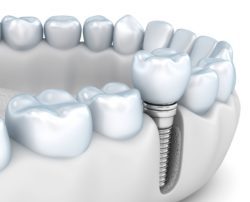Tooth loss can severely affect your quality of life. Without tooth replacement treatment from your dentist, you can face further oral health concerns. You can find the most comprehensive solution to replace missing teeth with dental implants.
Unlike removable dentures, implants will preserve the bone in your jaw if you have lost one or more teeth. Ask your dentist if dental implants will suit your unique dental needs in the wake of tooth loss. Read on to discover the impact that missing teeth have on your jawbone and how implant dentistry can help.

What Happens to the Jaw When You Lose a Tooth?
Healthy dental patients have a full arch of teeth on both the top and bottom of the mouth. These teeth have a root that extends below the gumline to the jaw. The tooth root stimulates the bone there, ensuring it stays strong and healthy.
If a patient loses one or more teeth, then the jaw can no longer receive stimulation. In the absence of the tooth root, the bone in the jaw begins to deteriorate.
This can create the appearance of sagging in the face. It may also lead remaining teeth to shift out of place, worsening oral function. These issues cannot be stopped without intervention from a dentist to replace missing teeth.
How Do Dental Implants Help Your Jaw?
If you want to address jaw health in the wake of tooth loss, your dentist will recommend replacing missing teeth with dental implants. These oral devices feature titanium post anchors that a dentist surgically inserts into the jaw. They fuse to the bone there to create an ideal support for prosthetic teeth.
The anchors serve as replacements for the missing tooth roots, stimulating the bone once more. This stops bone from degenerating and also encourages bone that may have already been lost to regrow.
You can preserve the facial and dental structure this way. Removable dentures will only replace teeth above the gumline and cannot offer this restorative dental benefit.
Can My Jaw Support a Dental Implant?
Though the advantages of tooth replacement with implant dentistry seem clear, not every dental patient will qualify for this treatment. Dental implants rely on fusion with jawbone to support dental prosthetics. If too much jawbone has already been lost due to tooth loss, the jaw might not be strong enough to sustain the anchor and therefore the implant.
Your dentist will evaluate your jawbone structure using x-ray imaging taken during a consult appointment. If your jaw is weak, your dentist might suggest a bone graft. This oral surgery will take other bone matter and attach it to your jawbone to build more stability.
When this heals, your jaw might be strong enough to sustain a dental implant. If this treatment is not feasible, your dentist might recommend alternative tooth replacement solutions. Schedule a consult with your dentist to learn if implant dentistry will best restore your smile after tooth loss.
